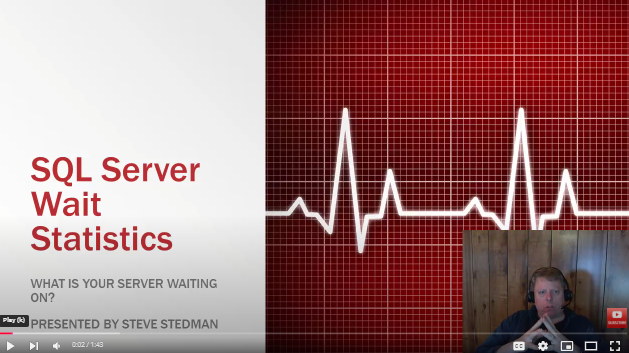Wait statistics, in the context of SQL Server, refer to the amount of time that a query spends waiting to access data in the database. When a client application requests data from the database, the request is placed in a queue and the client application must wait for its turn to access the data. The time that the query spends waiting is called a "wait" and is tracked by SQL Server. This information can be used to identify potential performance bottlenecks and optimize the performance of the database. Wait statistics are commonly used by database administrators to diagnose and troubleshoot performance issues in SQL Server.
SQL Server uses various wait types to provide insights into where processes encounter delays. The DEADLOCK_TASK_SEARCH wait type is related to SQL Servers internal mechanism for detecting deadlocks. A deadlock occurs when two or more tasks block each other indefinitely by holding locks on resources that the other tasks need. This wait type appears when SQL Server is actively searching for deadlocks to resolve.
What Is the DEADLOCK_TASK_SEARCH Wait Type?
The DEADLOCK_TASK_SEARCH wait type represents the time SQL Server spends scanning for potential deadlocks. When this wait type appears, it means SQL Server is actively working to detect and resolve deadlocks in the system to maintain database availability and prevent processes from being stuck indefinitely.
When Does DEADLOCK_TASK_SEARCH Appear?
This wait type typically appears in the following scenarios:
- High Contention When multiple tasks are competing for the same resources, leading to increased potential for deadlocks.
- Complex Queries Queries involving many tables, joins, or resources may increase the chances of deadlocks and trigger frequent scans.
- Lock Escalation When SQL Server escalates row-level locks to table-level locks, it can increase contention and the likelihood of deadlocks.
- Long-Running Transactions Transactions that hold locks for extended periods are more likely to contribute to deadlock scenarios.
Why DEADLOCK_TASK_SEARCH Waits Matter
While some DEADLOCK_TASK_SEARCH waits are normal in systems with high concurrency, excessive waits may indicate issues affecting performance or resource contention. Common causes include:
- Frequent Deadlocks High numbers of deadlocks lead to more time spent searching and resolving them.
- Poor Query Design Inefficient queries can hold locks longer than necessary, increasing the risk of deadlocks.
- Blocking Transactions Tasks waiting for resources held by other transactions can create the conditions for deadlocks.
- Inadequate Indexing Poor indexing strategies can lead to wider locks and higher contention.
How to Address DEADLOCK_TASK_SEARCH Waits
If DEADLOCK_TASK_SEARCH waits are affecting performance, consider these strategies to reduce deadlocks and improve overall system behavior:
- Optimize Queries Review and tune queries to ensure they execute efficiently and minimize lock duration.
- Use Proper Indexing Implement indexes that support your queries and reduce the scope of locks required.
- Break Down Transactions Divide long-running transactions into smaller, more manageable parts to reduce contention.
- Set Lock Timeouts Configure lock timeouts to prevent tasks from waiting indefinitely and reduce the likelihood of deadlocks.
- Review Execution Order Ensure that tasks access resources in a consistent order to reduce the chances of deadlock cycles.
Monitoring DEADLOCK_TASK_SEARCH Waits
To effectively monitor this wait type and track its impact over time, use the Historic Waits Monitoring feature in Database Health Monitor. This tool provides detailed insights into wait statistics, helping you identify trends, spot problem areas, and take proactive steps to minimize deadlocks and their associated waits.
Stedman Solutions specializes in SQL Server performance tuning and troubleshooting. Whether youre dealing with DEADLOCK_TASK_SEARCH waits or other SQL Server challenges, our Database Health Monitor provides valuable insights, and our managed services offer expert support to keep your SQL Server running smoothly. Contact us today to learn how we can help improve your SQL Server performance and reliability.

Find out more about our SQL Server Managed Services
Applies to
Related Waits
DEADLOCK_ENUM_MUTEXSee Also
All Wait Types


